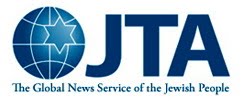 (JTA) — When lowering my shoulder, planting my feet and pushing hard to make something happen, I love to reflect on the Rev. Martin Luther King Jr.’s exhortation to act with “the fierce urgency of now.”
(JTA) — When lowering my shoulder, planting my feet and pushing hard to make something happen, I love to reflect on the Rev. Martin Luther King Jr.’s exhortation to act with “the fierce urgency of now.”
My feelings in those moments are usually not very MLK-like — self-righteousness, self-satisfaction and just a touch of self-pity make me feel both impatient and smug. Over the last month, however, “the fierce urgency of now” has challenged me in a new way, as I struggle to process the violence, oppression, naked fear, hatred and cynicism that is dominating our national news and politics and spilling into our communities.
The sense of urgency and the desire to act right now collides with two simple questions: What should I do? What can I do?
From conversations with friends and colleagues at other Jewish and secular organizations, especially those engaged in volunteering and service, I know I’m not alone either in feeling a sense of urgency or in asking these questions. At Repair the World, we approach this challenge by focusing on our simplest premise: Jewish life and Jewish values offer not just the inspiration and imperative to heal what’s broken in our world, but also give us guidance about how to do it.
Here are four foundational lessons, grounded in Jewish principles, which have been tested and verified by Repair the World and others as best practices for service engagement — that is, inspiring individuals and organizations, especially millennials, to serve their communities, society and the world. Whether their intention is to pack and deliver food boxes to the needs or teach inner-city girls how to write computer code, these practices provide bedrock stability from which they — we — can lean into the challenging issues of our times.
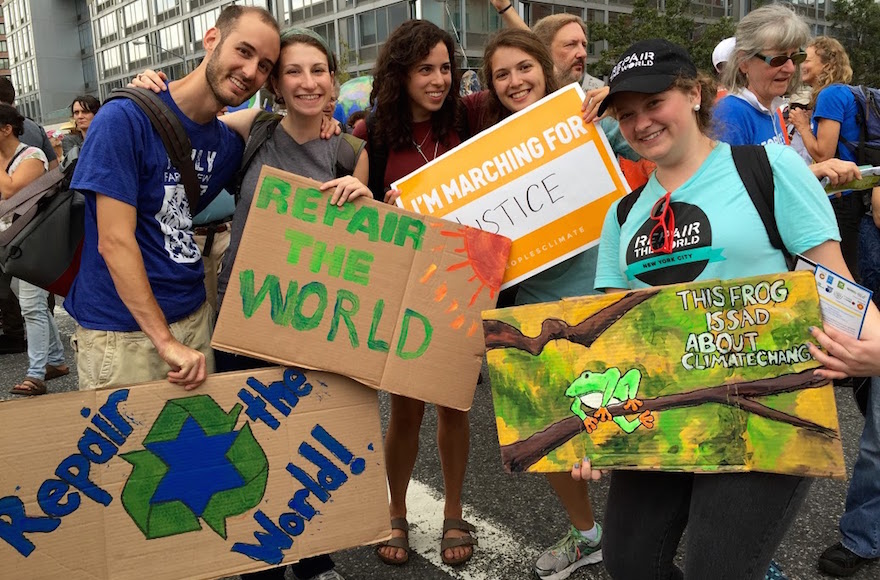
Use your hands, head and heart: The secular service world teaches that transformative service requires three elements: hands-on volunteering, contextual education and personal reflection. These elements echo the beginning of Pirkei Avot, the Jewish wisdom collection also know as Ethics of Our Ancestors: “The world rests on three pillars: Torah [study/education]; service of God [spiritual reflection]; and deeds of kindness.” (1:2) These pillars bring balance and therefore strength to the most difficult kind of work; these are the tools that enable Jewish young adults to stay resolved and grow when they confront deeply troubling issues in local communities.
Be real, even (especially) when it’s uncomfortable: Authenticity and discomfort win over spin and polish every time. The most essential way to perform authentic service is also the most difficult thing to do: addressing the actual, self-expressed needs of the community that you are serving. Pirkei Avot suggests there are 48 ways to learn, which include “a listening ear,” “deliberation in study,” “asking and answering,” “listening and illuminating” and “learning in order to teach.” (6:6) If we don’t listen to those we intend to serve, we contribute to injustice for others.
Temper urgency with curiosity: It’s easy to be lost in the urgent need to act, especially when human lives (or souls) are on the line. We make a terrible error, however, when we become too emotionally invested in the action. When an organization says its doesn’t have the time, energy or money to learn more about the hypotheses underlying its model, it is a sign of too much emotional investment. Again, Pirkei Avot: “If there is no Torah study, there is no ‘derech eretz’; if there is no derech eretz, there is no Torah.” That is, “If there is no applied knowledge, there is no analytical knowledge. If there is no analytical knowledge, there is no applied knowledge.” (3:2) From the entrepreneurial revolution of the last two decades we know whoever learns the fastest has the highest likelihood of success. This is no less true in the nonprofit sector.
Be an ally, not a superhero: Jewish young adults feel most gratified and empowered when they are able to build meaningful relationships both with people like them and with people unlike them who experience oppression in a more personal way. This is probably what Ben Zoma, quoted in Pirkei Avot, meant in saying, “Who is wise? One who learns from every person.” (4:1) Peer-to-peer engagement is a critical first step in building close bonds and new community through powerful shared experiences.
These Jewish values not only make service more meaningful and more effective, but they make it more likely that more young Jews will engage seriously with the programs and be part of a community around them.
Many organizations and communities that are doing this important work are joining in the inaugural “Service Matters: A Summit on Jewish Service” in New York on Sept. 15. With Repair the World serving as convener, a diverse group of professionals, social entrepreneurs, current and prospective funders, Jewish educators and others will explore ways of working to engage people — especially Jewish millennials — in meaningful service through a Jewish lens.
The summit will be an opportunity to elevate meaningful service in Jewish life, strengthen the bond between Jewish values and engaging young Jews, and wrestling with our responses as Jews and human beings to the issues of our time. Together, with urgency, we can bring the change, be the change, that all of us wish to see.
(David Eisner is CEO of Repair the World. Learn more about the upcoming “Service Matters: A Summit on Jewish Service.”)
Source: “Millennials want to serve. Jewish tradition tells them how,” David Eisner, JTA, September 5, 2016
 The Louisville Jewish Community Center has had a garden for years, but never the staff to make the most of it. For Michael Fraade, a member of the first cohort of Hazon’s JOFEE Fellowship who is spending the year working on the JCC’s environmental programming, that garden has the potential to change the ways in which members of the community understand the rich relationship between the earth and Judaism.
The Louisville Jewish Community Center has had a garden for years, but never the staff to make the most of it. For Michael Fraade, a member of the first cohort of Hazon’s JOFEE Fellowship who is spending the year working on the JCC’s environmental programming, that garden has the potential to change the ways in which members of the community understand the rich relationship between the earth and Judaism.
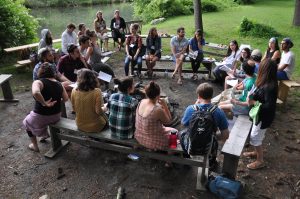
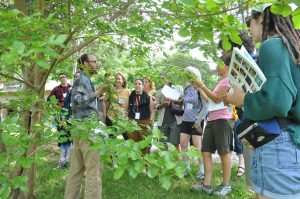 As the Jim Joseph Foundation has discussed, collaboration comes with real challenges. Yet time and again we see that the benefits—creative initiatives; greater reach; more opportunities to scale and to become sustainable—outweigh these challenges. It is not unlike a basketball team where superstars come together, perhaps giving up solo fame and the chance to each score more, for the singular focus of winning a championship, which everyone on the Warriors wants to accomplish again, especially after a particularly disappointing Game 7 loss on June 19th (yes, I remember the date). The recruitment of Kevin Durant was not a singular coach speaking with a player. Amidst many dealmakers on both sides of the negotiation table, four long-tenured Warriors were all a part of the process and the effort to recruit Durant. Each of them knew that bringing him to the Bay Area would greatly increase their chances at another championship season while as a counter-point acknowledging that bringing this addition would likely reduce the shot attempts and general production value of several if not all of these four players.
As the Jim Joseph Foundation has discussed, collaboration comes with real challenges. Yet time and again we see that the benefits—creative initiatives; greater reach; more opportunities to scale and to become sustainable—outweigh these challenges. It is not unlike a basketball team where superstars come together, perhaps giving up solo fame and the chance to each score more, for the singular focus of winning a championship, which everyone on the Warriors wants to accomplish again, especially after a particularly disappointing Game 7 loss on June 19th (yes, I remember the date). The recruitment of Kevin Durant was not a singular coach speaking with a player. Amidst many dealmakers on both sides of the negotiation table, four long-tenured Warriors were all a part of the process and the effort to recruit Durant. Each of them knew that bringing him to the Bay Area would greatly increase their chances at another championship season while as a counter-point acknowledging that bringing this addition would likely reduce the shot attempts and general production value of several if not all of these four players.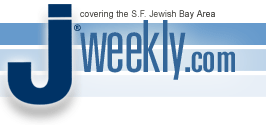 The S.F.-based Jewish Community Federation raised $22.1 million in philanthropic gifts during its 2015-2016 fiscal year, funds that will provide services and programs focusing on Jewish life locally and internationally.
The S.F.-based Jewish Community Federation raised $22.1 million in philanthropic gifts during its 2015-2016 fiscal year, funds that will provide services and programs focusing on Jewish life locally and internationally. Children are served best in classrooms and other learning environments that consistently take into account their specific learning needs. The support children receive is most effective when it is offered throughout the entire day of learning—by all educators—as opposed to only specific periods of the day.
Children are served best in classrooms and other learning environments that consistently take into account their specific learning needs. The support children receive is most effective when it is offered throughout the entire day of learning—by all educators—as opposed to only specific periods of the day.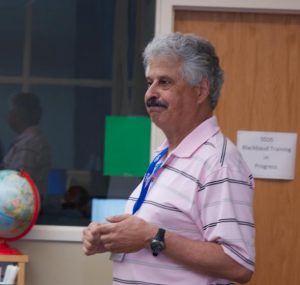
 From
From 
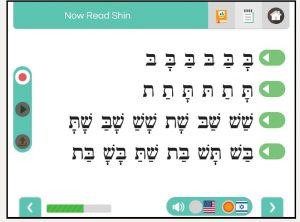 ng its fourth year, JCC Manhattan’s
ng its fourth year, JCC Manhattan’s  Synagogues and families tell JJP they are interested in the benefits that the Hebrew Homepage can offer all students, whether or not they are enrolled in JJP. Responding to this demand, JJP will roll out the Hebrew Homepage as a stand-alone service that any congregation or student can subscribe to, to strengthen their Hebrew acquisition. As a way of becoming a sustainable venture beyond the pilot funding phase, Hebrew Homepage will become a fee-for-service program that will help offset the philanthropic contributions that launched JJP.
Synagogues and families tell JJP they are interested in the benefits that the Hebrew Homepage can offer all students, whether or not they are enrolled in JJP. Responding to this demand, JJP will roll out the Hebrew Homepage as a stand-alone service that any congregation or student can subscribe to, to strengthen their Hebrew acquisition. As a way of becoming a sustainable venture beyond the pilot funding phase, Hebrew Homepage will become a fee-for-service program that will help offset the philanthropic contributions that launched JJP.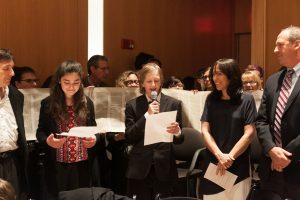 grade students and parents meet six times for family learning, and students meet weekly in their own class, Judaism On One Foot: Bring It Home and Making It Your Own. Students also study individually with a teacher to read and discuss their Torah portion, and develop a response to this portion that might be a video, musical performance, or an interactive experience for guests. The actual
grade students and parents meet six times for family learning, and students meet weekly in their own class, Judaism On One Foot: Bring It Home and Making It Your Own. Students also study individually with a teacher to read and discuss their Torah portion, and develop a response to this portion that might be a video, musical performance, or an interactive experience for guests. The actual  Earlier this year, Barry Chazan, professor emeritus of education at the Hebrew University of Jerusalem, penned an
Earlier this year, Barry Chazan, professor emeritus of education at the Hebrew University of Jerusalem, penned an 